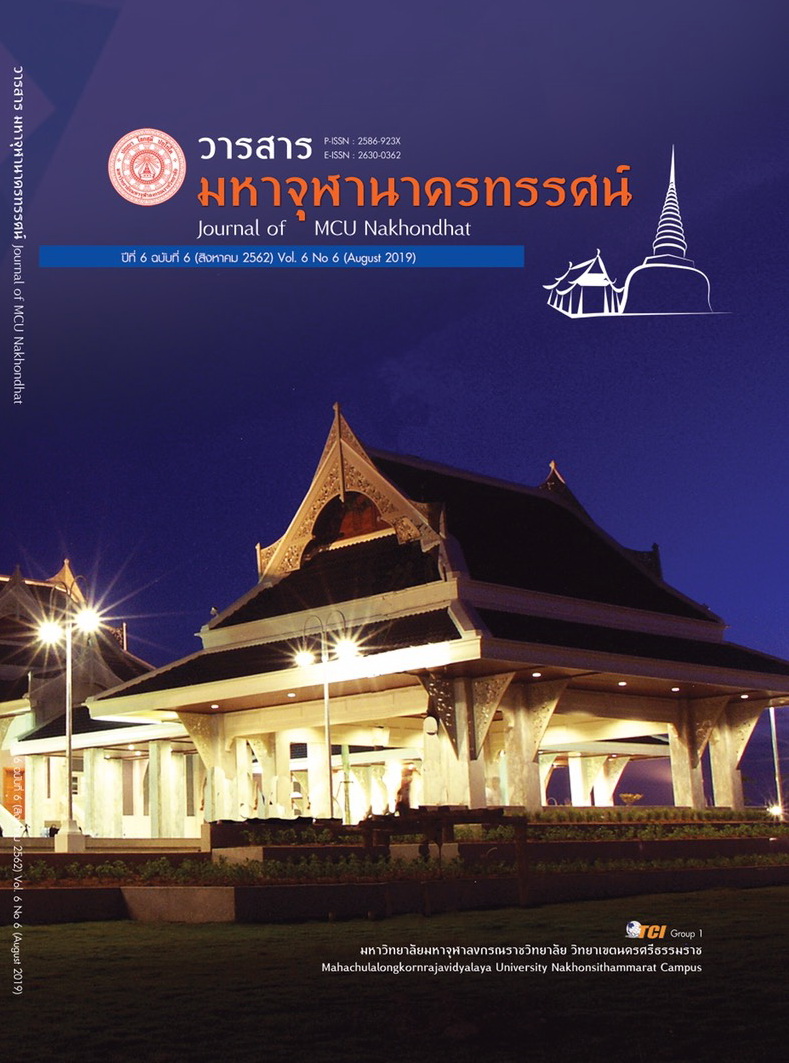MODEL OF HAPPINESS MONASTERY DEVELOPMENT BY SUPPAYA BASED ON BUDDHIST PSYCHOLOGY
Main Article Content
Abstract
The purpose of this study were 1) to study the problems of contexts of monastery and concept of model of happiness monastery development by Suppaya based on Buddhist psychology in Saraburi province 2) to create model of happiness monastery development by Suppaya based on Buddhist psychology in Saraburi province 3) to present model of happiness monastery development by Suppaya based on Buddhist psychology in Saraburi province. Mixed methods research was used for research design. The population are People who make merit in Wat Phrabuddhabat and sample survey 400 in Wat Phrabuddhabat.
The results revealed that
- the problems of contexts of monastery and concept of model of happiness monastery development by Suppaya based on Buddhist psychology in Saraburi province: the strength of the monastery In Saraburi province are duty practice towards the practice of dharma, being calm and free from interference, setting in a prosperous urban area, approachable and easy to find transportation vehicles easy. The atmosphere in the monastery are clean, peaceful, shady, airy, cool and windy. There are alms-resort villages around Wat Prabuddhabat Temple and dense community. The weakness of the monastery In Saraburi province are the setting of an environment that is not conducive to being Suppaya and a community around the monastery, fear of change and destruction of the monastery's history. 2) According to SWOT Analysis of the creation of model of happiness monastery development by Suppaya based on Buddhist psychology in Saraburi province found that 1) The internal environment of the monastery is to arrange the corner of a house of pleasure, public relation boards, memorial photo corner, talking tree and dharma puzzle signs 2) Happiness merit making activities are to receive a bowl in the pavilion, to pray, to listen Dhamma and to arrange moral camps named “Life can be developed if the mind has a morality” 3) Happiness community activities are alms-giving for impoverished person around the monastery, volunteer of development monastery, life skills, life conquest game and life development by turning crisis into opportunities. 3) The results of the evaluation of the satisfaction of people who make merit at the monastery showed that they satisfied with the model of happiness monastery development by Suppaya based on Buddhist psychology at high level. This is a confirmation of monastery development based on the ACCG model Wat Model that can make visitors in the monastery happy in 4 aspects of health which are physical, emotional, social and intellectual.
Article Details
How to Cite
สุวโจ (มณีวงษ์) พ., . พ., & ภูวชนาธิพงศ์ ก. (2019). MODEL OF HAPPINESS MONASTERY DEVELOPMENT BY SUPPAYA BASED ON BUDDHIST PSYCHOLOGY. Journal of MCU Nakhondhat, 6(6), 2821–2841. retrieved from https://so03.tci-thaijo.org/index.php/JMND/article/view/206154
Section
Research Articles
References
พระครูโสภณพุทธารักษ์ (ธมฺมรโส) และคณะ. (2560). การประยุกต์หลักสัปปายะ 7 เพื่อพัฒนาครูสมาธิรุ่น 39 สถาบันพลังจิตตานุภาพ สาขา 73 วัดพระงาม จังหวัดตรัง. ใน รายงานการวิจัย สาขาวิชาสันติศึกษาบัณฑิตวิทยาลัย. มหาวิทยาลัยมหาจุฬาลงกรณราชวิทยาลัย.
พระวีระศักดิ์ ชยธมฺโม (สุวรรณวงศ์). (2558). แนวทางการจัดการวัดสันติสุขตามหลักสัปปายะ 7: กรณีศึกษาวัดธารน้ำไหล จังหวัดสุราษฎร์ธานี. วารสารสันติศึกษาปริทรรศน์ มจร, 3(2), 98-114.
พุทธะดอทคอม. (2560). ความรู้เกี่ยวกับพระสงฆ์. เรียกใช้เมื่อ 13 กรกฎาคม 2560 จาก https://www.phuttha.com/พระสงฆ์/ความรู้เกี่ยวกับพระสงฆ์/สัปปายะ7
วชิระ เพ็งจันทร์. (2556). ธรรมะช่วยเสริมสุขภาพจิตแก้ปัญหาวัยรุ่น สำนักงานกองทุนสนับสนุนการสร้างเสริมสุขภาพ (สสส.). เรียกใช้เมื่อ 11 มีนาคม 2556 จาก https://www.thaihealth.or.th/Content/3154-ธรรมะช่วยเสริมสุขภาพจิตแก้ปัญหาวัยรุ่น.html
สำนักงานกองทุนสนับสนุนการสร้างเสริมสุขภาพ (สสส.). (2559). วัดสร้างสุข โลกแห่งสัปปายะ. กรุงเทพมหานคร : โครงการวัดสร้างสุข สมาคมส่งเสริมเทคโนโลยี (ไทย-ญี่ปุ่น).
พระวีระศักดิ์ ชยธมฺโม (สุวรรณวงศ์). (2558). แนวทางการจัดการวัดสันติสุขตามหลักสัปปายะ 7: กรณีศึกษาวัดธารน้ำไหล จังหวัดสุราษฎร์ธานี. วารสารสันติศึกษาปริทรรศน์ มจร, 3(2), 98-114.
พุทธะดอทคอม. (2560). ความรู้เกี่ยวกับพระสงฆ์. เรียกใช้เมื่อ 13 กรกฎาคม 2560 จาก https://www.phuttha.com/พระสงฆ์/ความรู้เกี่ยวกับพระสงฆ์/สัปปายะ7
วชิระ เพ็งจันทร์. (2556). ธรรมะช่วยเสริมสุขภาพจิตแก้ปัญหาวัยรุ่น สำนักงานกองทุนสนับสนุนการสร้างเสริมสุขภาพ (สสส.). เรียกใช้เมื่อ 11 มีนาคม 2556 จาก https://www.thaihealth.or.th/Content/3154-ธรรมะช่วยเสริมสุขภาพจิตแก้ปัญหาวัยรุ่น.html
สำนักงานกองทุนสนับสนุนการสร้างเสริมสุขภาพ (สสส.). (2559). วัดสร้างสุข โลกแห่งสัปปายะ. กรุงเทพมหานคร : โครงการวัดสร้างสุข สมาคมส่งเสริมเทคโนโลยี (ไทย-ญี่ปุ่น).


